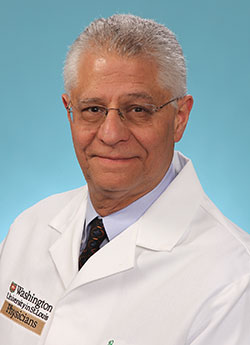Siegel receives honor from American College of Radiology
Recognized for helping develop PET imaging as clinical and research tool

Siegel
Barry A. Siegel, MD, a professor of radiology and of medicine at Washington University School of Medicine in St. Louis, has received the Gold Medal Award from the American College of Radiology for his more than 40 years of leadership in the nuclear medicine community. The honor recognizes his accomplishments in helping develop positron emission tomography (PET) into a major clinical and research tool and elevating the quality of imaging clinical trials. The Gold Medal Award is the society’s highest honor.
Siegel helped develop PET methods for imaging hypoxia, and for assessing the utility of both conventional and novel agents in studying breast, prostate, cervical and other cancers. Much of this research, including the first human studies with radiolabeled estrogen, has been focused on approaches for predicting and monitoring response to cancer treatment.
As associate principal investigator of the American College of Radiology Imaging Network — now known as the ECOG-ACRIN Cancer Research Group — Siegel helped guide a wide range of clinical trials of PET imaging, bridging the gap between clinicians and imaging specialists and elevating the quality of clinical trial conduct in imaging.
At Washington University’s Mallinckrodt Institute of Radiology, Siegel served as senior vice chair and division director of nuclear medicine for over four decades before stepping down in 2017. During his tenure, he introduced clinical PET services to the portfolio of activities offered in nuclear medicine. The success of moving PET into clinical care at Washington University paved the way for many other medical centers. Consistent with his commitment to evidence-based nuclear medicine, Siegel and colleagues developed the National Oncologic PET Registry to study how F-18 fluorodeoxyglucose PET (FDG-PET) scanning could be applied to improve clinical care for a wide variety of cancers and indications. Their work, in collaboration with the Centers for Medicare & Medicaid Services, resulted in near-universal coverage of FDG-PET imaging in oncology.






